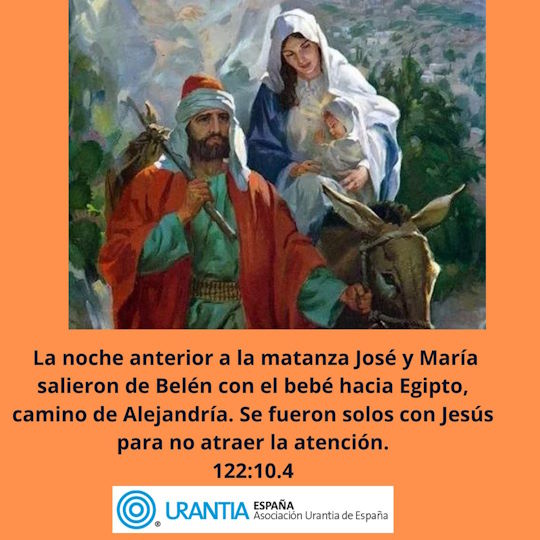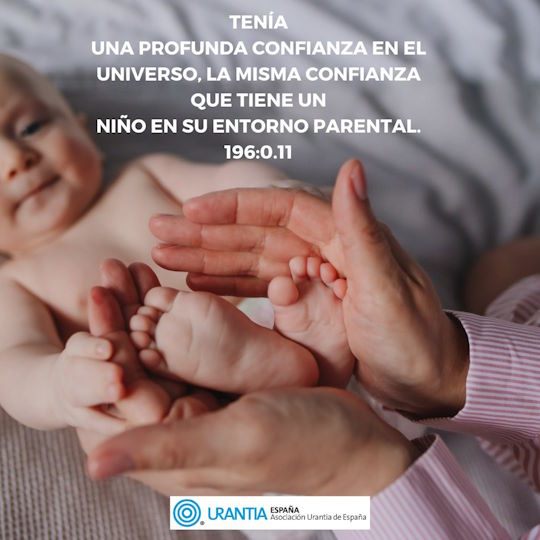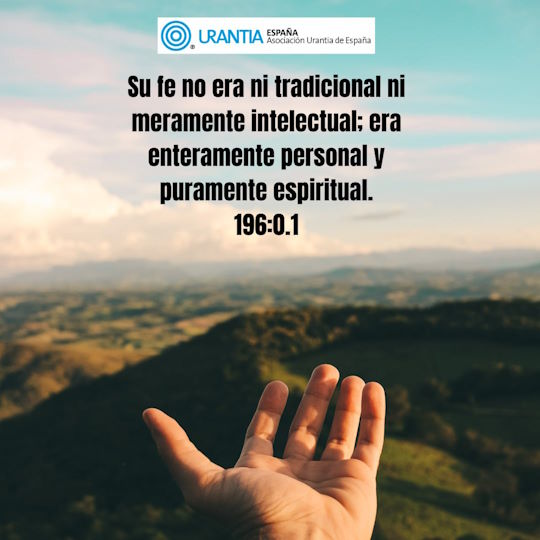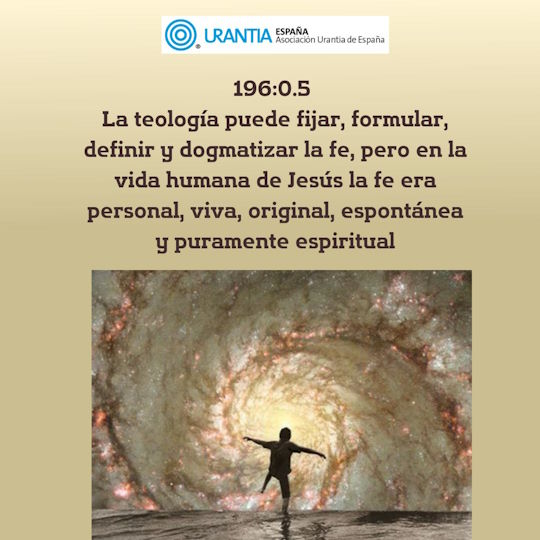© 2023 M. José Sánchez
© 2023 Urantia Association of Spain
¶ Be yourself

One more year, the long-awaited Christmas holidays bring us short days, cold weather and numerous beautiful scenes in nature: the mistletoe shows off its fruits, the fir trees decorate our cities, the poinsettia lights up our homes with its intense red or the ice sparkles at dawn.
It also brings us a new year, 2024, a year that we just started now in January. A year that still gives off the smell of our beautiful Christmas wishes: our desire to take care of what is beautiful, to search for what is true, to offer the world the best of ourselves.
These messages of good Christmas wishes, these messages that speak of the “arrival of a Savior,” of opening our hearts, radically clash with many messages that surround us on social networks and the media, all of them in the hands of large multinationals that are not interested in empowering human beings or seeking their liberation by alluding to the transcendence in our lives. On TV, on Instagram, talking about God or our divine spark is still not very well regarded. Talking about death and what lies behind it in our work or with friends may sound strange or suspicious, but that is precisely what the world needs after Christmas: bringing the everyday to that light that we know it needs to transform.
One more month, we continue with our issue of Luz y Vida, trying to contribute our best ideas and feelings to bring the new humanity that the world needs closer to reality, to make the utopia that guides us on our path more palpable. In other words: “Heaven on Earth.”
Will you join us? We invite you one more month to read our suggestions and contributions, to unravel among so many words some light, some emotion that inspires your journey. Because what great power words have!
Once upon a time there was a word
round, whole, shiny.
Inside the word was the world.
And in the world we were,
saying words to us.
(Graciela Montes)
In this issue you can see four interesting works from the website:
- Jesus, man and myth (Dick Bain)
- Testimonies from readers of The Urantia Book (compiled by Saskia Praamsma)
- Evolution and progress (Eduardo Altuzarra)
- The cultural impact of The Urantia Book in the next 50 years (Meredith Sprunger)
We continue with the informative sections of the “Chronicle of the Life of Jesus” (paper 151) and the “Guide to The Urantia Book for Children”: Jesus at 16 years old.
Luis García Bory very kindly answers the Urantian Questionnaire.
We are celebrating, as the Barcelona study group is celebrating 20 years of meetings and twinning! Congratulations!
Luis Alfonso Rojas explains to us which is “My favorite paragraph” from the blue book.
In the section “Other books on spiritual growth” we bring you the recent and very enlightening God: The science, the evidence (Michel-Yves Bolloré and Olivier Bonnassies).
And we do not forget to announce virtual group activities such as the new courses of the Urantia Book International School (UBIS) and the “Urantian talks” for the month of January: on the one hand, we will have a debate on the possibilities of AI and we will also have an analysis of current events in the Zoom room, our path towards light and life.
Come with us and we will explore many possibilities to grow and learn together, one more month, in this newsletter. Your newsletter, because we are open to your contributions and suggestions.
So let’s begin…
Everything seemed very nice regarding the birth of Jesus, populated by seraphim singing hymns, announcements to surprised women or picturesque wise priests of Ur. The birth of the hero, however, is always accompanied by dangers and threats of death. It cannot be otherwise: there is no hope that opens up without sooner or later being threatened, since there is always someone who doubts, who does not want to. There is always someone who fights for everything to remain as it is. For there to be no changes.
The massacre of these infants took place about the middle of October, 6 B.C., when Jesus was a little over one year of age. But there were believers in the coming Messiah even among Herod’s court attachés, and one of these, learning of the order to slaughter the Bethlehem boy babies, communicated with Zacharias, who in turn dispatched a messenger to Joseph; and the night before the massacre Joseph and Mary departed from Bethlehem with the babe for Alexandria in Egypt. In order to avoid attracting attention, they journeyed alone to Egypt with Jesus. They went to Alexandria on funds provided by Zacharias, and there Joseph worked at his trade while Mary and Jesus lodged with well-to-do relatives of Joseph’s family. They sojourned in Alexandria two full years, not returning to Bethlehem until after the death of Herod. (UB 122:10.4)
Joseph is forced to take his mother and young son and leave, to leave his own land, to escape from what is known, to dislodge himself and start again. But it is not a full stop (as if what came before was worthless): it is a full stop, since Joseph must take the child and the mother with him. He takes the past and the future, tradition and renewal, fidelity and creativity. Joseph takes these elements in his backpack and sets out on the journey to Egypt. A great deal of baggage to start over, heading towards the unknown.
The problem is that almost all of us prefer to stay where we are: we are not so young anymore (we tell ourselves), here I am, after all, quite well. Won’t I ruin everything if I move? Isn’t the devil you know better than the devil you don’t?
This widespread, immobile attitude is lethal to spiritual life. Let us think for a moment: if Joseph had not wanted to emigrate to Egypt, the result would have been the murder of the child. Herod, the king, would have killed him, like the other innocent children of his age. Truly, we will die if we do not introduce periodic exoduses into our lives.
Whoever does not flee from the conventional, the trite, the massified, puts his soul, his uniqueness, in danger. That personal treasure that each one of us keeps inside is something extremely delicate. In reality, it takes little to corner it and forget about it. The many Herod kings of this world put an end to it: they distort it with systematic strategies to leave us blind and deaf, they pervert it or minimize it, turning it into a childhood memory or a residue of the past.
At the birth of a new king, Herod fears being supplanted. The ego always fears being displaced by the true self, by our true being. The birth of our inner child is always dangerous, because the ego is threatened. In the battle that rages within us, between the king and the child, who will ultimately emerge victorious? Will what we have built over so many years fall like a house of cards over something insignificant? That is what we would think when we are Herod, when we do not want anything to change, when we want the status of things to remain the same.
We do not want to stand out and be different from others. It is not easy to be faithful to our own inner voice, the authentic one, to that precious child. Nobody wants to swim against the current because it is uncomfortable, tiring and it is difficult for us to get far. They can label us as strange, as not being “one of us”, as being marginal…
But it’s not that we have moved away, but that our interest in God (silence, spirituality, whatever you want to call it) makes you enter another sphere: you read other books, you go with other people, you spend your free time in another way. We walk in pursuit of our own voice, we go down unexplored paths, we begin to be ourselves.
Those of us who follow Jesus of Nazareth go with someone who listened to his own voice. We would like to grow sensibly, without accidents, without stumbles or criticism, but we follow someone who, for the world, was a failure. His family thought he was crazy. His people took him to the gallows. The religious and political power of his time sentenced him and got rid of him. His disciples abandoned him. How can someone who tries to change the very foundation of society, who aspired to freely enjoy the relationship with God, his brothers and nature, not fail?
As we said above, the birth of the hero is always accompanied by dangers and threats of death. It cannot be otherwise: there is no hope that opens up without sooner or later being threatened, since there is always someone who doubts, who does not want to; there is always someone who fights for everything to remain as it is.
Well, what a task we human beings have! To be faithful, like Jesus, to our own inner voice, to our inner child, in the face of a world that wants us to be homogeneous, materialistic, flat. There are so many Herods who endanger our own voice! There are so many elements in the world to distract us and forget who we really are! There are so many circumstances that can make us feel like we are alone in the universe and helpless!
In the earthly life of Jesus, religion was a living experience, a direct and personal movement from spiritual reverence to practical righteousness. The faith of Jesus bore the transcendent fruits of the divine spirit. His faith was not immature and credulous like that of a child, but in many ways it did resemble the unsuspecting trust of the child mind. Jesus trusted God much as the child trusts a parent. He had a profound confidence in the universe—just such a trust as the child has in its parental environment. Jesus’ wholehearted faith in the fundamental goodness of the universe very much resembled the child’s trust in the security of its earthly surroundings. He depended on the heavenly Father as a child leans upon its earthly parent, and his fervent faith never for one moment doubted the certainty of the heavenly Father’s overcare. He was not disturbed seriously by fears, doubts, and skepticism. Unbelief did not inhibit the free and original expression of his life. He combined the stalwart and intelligent courage of a full-grown man with the sincere and trusting optimism of a believing child. His faith grew to such heights of trust that it was devoid of fear. (UB 196:0.11)

Lord, dear Master, if you were to manifest yourself now with certainty (as we so often want) there would be no history: everything would happen at once, there would be no before and after, there would be no growth in maturity or progression in love. My God, you are in love with history, with time! You are a God who likes pedagogy. You are a God in love with us and you build with each one of us, like a divine strategist, a love story. You build with all of our unique voices a beautiful symphony of infinite scope. All united, all unique.
Bayazid, the Muslim saint, sometimes deliberately acted against the external forms and rites of Islam. He liked to show his own, unconventional way of understanding union with God. It happened once that, returning from Mecca, he stopped in the Iranian city of Rey. The citizens, who venerated him, flocked to welcome him and caused a great commotion throughout the city.
Bayazid, who was fed up with so much flattery, held out until he reached the market square. Once there, he bought a loaf of bread and began to eat it in full view of his fervent followers. It was a fasting day in the month of Ramadan, but Bayazid considered that his trip fully justified the breaking of religious law.
But his followers did not think the same, and were so scandalized by his behavior that they immediately abandoned him and went home. Bayazid said with satisfaction to one of his disciples: “Look how, the moment I did something contrary to what they expected of me, the veneration they professed to me disappeared.”
Jesus completely scandalized his followers for similar reasons.
The crowds need a saint to venerate, an influencer to follow, someone to think for them. Better than thinking for ourselves or listening to our most authentic voice.

Jesus’ faith in God was sublime and unreserved. He experienced the ordinary ups and downs of mortal existence, but he never questioned his religious certainty that he was under the guidance and watchful care of God. His faith emanated from an inner vision born of the activity of the divine presence, the indwelling Adjuster. His faith was neither traditional nor merely intellectual; it was entirely personal and purely spiritual. 196:0.1
Let’s take on this challenge, then. Let’s try to be yourself, as the Master himself did centuries ago.
Theology can fix, formulate, define and dogmatize faith, but in the human life of Jesus faith was personal, alive, original, spontaneous and purely spiritual. UB 196:0.5
It is a magnificent challenge for this new year, 2024.
Let’s go for it then!

¶ References
- Index of the magazine “Luz y Vida” of the Association of Spain
- This article from the magazine “Luz y Vida Online”